Stout–Vogel Ministry
The Stout–Vogel Ministry was the second responsible government to be formed in New Zealand. It formed in August 1884 and governed until October 1887. From the outset, Robert Stout served as Prime Minister as well as Attorney-General whilst Julius Vogel held the post of Minister of Finance. Initially, the ministry lasted only two weeks, with Harry Atkinson managing to pass a vote of no confidence against Stout. However, Atkinson failed to establish his own government, and was unable to supplant Stout and Vogel who remained in power for the next three years.
| Stout–Vogel Ministry | |
|---|---|
| ministries of New Zealand | |
| 1884–1887 | |
| Date formed | 16 August 1884 |
| Date dissolved | 8 October 1887 |
| People and organisations | |
| Head of state | Victoria |
| Head of government | Robert Stout |
| Deputy head of government | Julius Vogel |
| Member party | Stout–Vogelites |
| Opposition party | Conservatives |
| Opposition leader | |
| History | |
| Election(s) | |
| Predecessor | Atkinson Ministry, 1883–1884 |
| Successor | Atkinson Ministry, 1884 |
Background
Vogel had the larger following in the coalition, but his poor health caused him to yield the premiership to Stout. Regardless, many observers still saw Vogel as the more dominant partner in the alliance. Both men were highly active in building consensus between the growing labour movement and middle-class liberalism. Both leaders were likeminded on social policy, however frequently clashed over financial policy.[1]
At the time the ministry was formed, New Zealand was in a prolonged economic recession. As Treasurer, Vogel did what he could to promote recovery, including borrowing, though with little success. The initially hopeful populace lost faith that the government could restore economic prosperity, viewing that retrenchment was the only solution, not expansionism. Atkinson passed another motion of no confidence against the government on 28 May 1887. Stout was granted a dissolution, but the subsequent election went against the Ministry and Stout himself suffered the indignity of losing his own seat.[2]
Ministers
The following members served in the original and reconstructed Stout–Vogel Ministry:[3]
| Name | Image | Office | Term |
|---|---|---|---|
| Robert Stout | 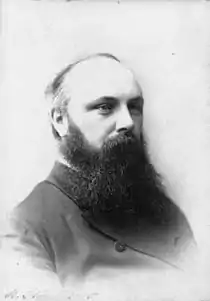 |
Prime Minister | 16 August 1884 – 8 October 1887 |
| Attorney-General | 16 August 1884 – 8 October 1887 | ||
| Julius Vogel | 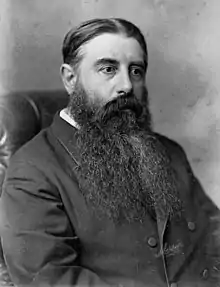 |
Minister of Finance | 16 August 1884 – 8 October 1887 |
| Postmaster-General | 16 August 1884 – 8 October 1887 | ||
| Minister of Trade & Customs | 3 September 1884 – 8 October 1887 | ||
| Edward Richardson | 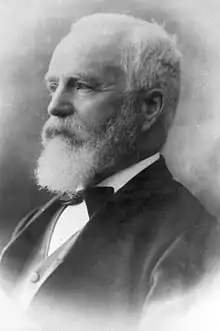 |
Minister of Public Works | 16 August 1884 – 8 October 1887 |
| James Macandrew | 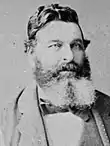 |
Minister of Lands | 16 August 1884 – 28 August 1884 |
| Minister of Mines | 16 August 1884 – 28 August 1884 | ||
| Minister of Immigration | 16 August 1884 – 28 August 1884 | ||
| William Montgomery |  |
Colonial Secretary | 16 August 1884 – 28 August 1884 |
| Minister of Education | 16 August 1884 – 28 August 1884 | ||
| John Ballance | 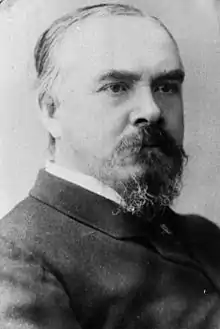 |
Minister of Native Affairs | 16 August 1884 – 8 October 1887 |
| Minister of Defence | 16 August 1884 – 8 October 1887 | ||
| Minister of Lands | 3 September 1884 – 8 October 1887 | ||
| Minister of Immigration | 3 September 1884 – 8 October 1887 | ||
| George Stoddart Whitmore |  |
Member of Executive Council | 16 August 1884 – 28 August 1884 |
| George Morris | 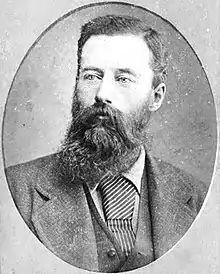 |
Minister of Trade & Customs | 19 August 1884 – 28 August 1884 |
| Joseph Tole |  |
Minister of Justice | 3 September 1884 – 8 October 1887 |
| Patrick Buckley |  |
Colonial Secretary | 3 September 1884 – 8 October 1887 |
| William Larnach | 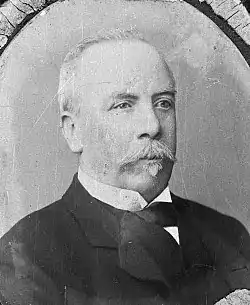 |
Minister of Mines | 3 September 1884 – 8 October 1887 |
| Minister of Marine | 3 September 1884 – 8 October 1887 | ||
| William Reynolds | 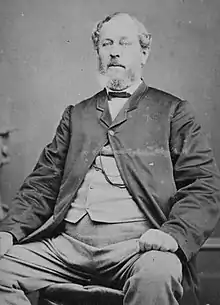 |
Member of Executive Council | 3 September 1884 – 8 October 1887 |
Notes
- Sinclair, Keith; Dalziel, Raewyn. "Vogel, Julius". Dictionary of New Zealand Biography. Ministry for Culture and Heritage. Retrieved 27 April 2020.
- Hamer, David. "Stout, Robert". Dictionary of New Zealand Biography. Ministry for Culture and Heritage. Retrieved 6 February 2016.
- Wilson 1985, pp. 69–70.